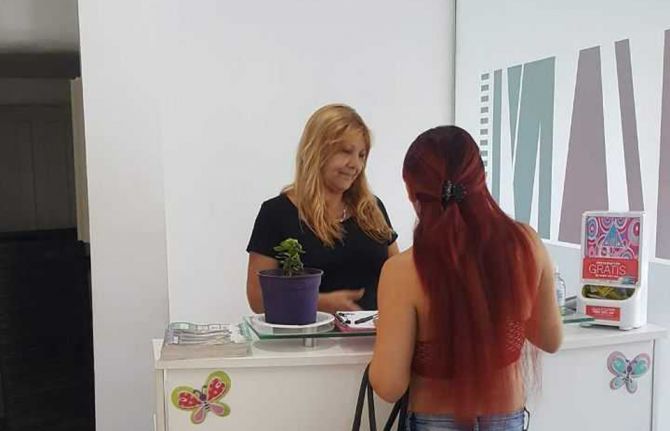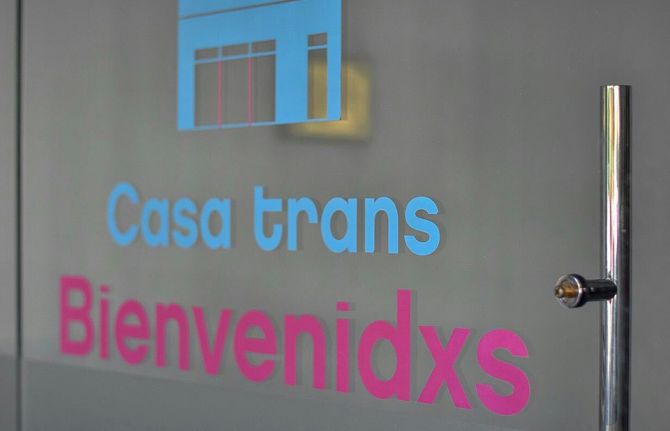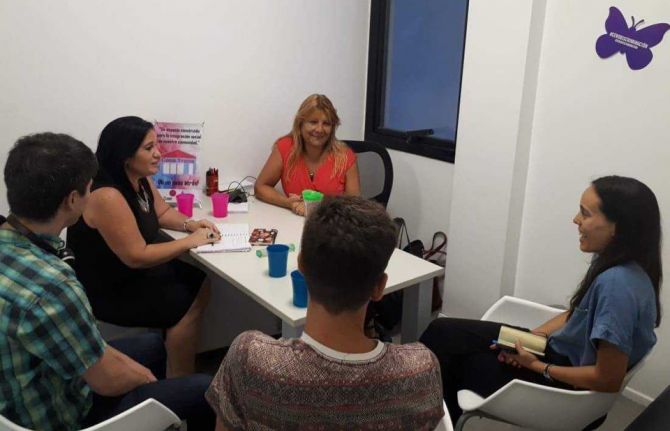



Feature Story
The Transgender House: a community centre for transgender people in Buenos Aires
29 March 2018
29 March 2018 29 March 2018Kimi Avalos is a young transgender woman who lives in Buenos Aires, Argentina. Because of stigma and discrimination, she couldn’t continue with her studies and complete high school. She says that she experienced bullying and harassment; her classmates insulted and physically assaulted her, under the indifferent eye of her teachers. “I really wanted to learn, but I had to drop out of school. Now, thanks to the Transgender House, my dream of finishing high school will soon come true,” said Ms Avalos.
Ms Avalos is one of 30 transgender students who recently started a new educational programme through which they can study for primary and secondary school diplomas by attending a combination of face-to-face and virtual classes. This innovative project is implemented in the Transgender House, a community centre for training and empowerment of transgender people founded in Buenos Aires in June 2017 by Marcela Romero, Coordinator of ATTTA (Association of Argentinian Transvestites, Transsexuals and Transgender) in collaboration with the City Council of Buenos Aires.
“To have this house has meant that as transgender people, we can come out from the darkness. The centre is in a visible space, on one of the main streets of Buenos Aires, in the San Cristóbal neighbourhood. This is our achievement; it shows that we exist as a community and that we have the right to a space like any other organization,” explains Ms Romero.
In Argentina, as well as in the rest of Latin America and the Caribbean, stigma and discrimination undermine learning opportunities and educational achievement of transgender people, thus affecting their future employment prospects. Discrimination and stigmatization also prevent transgender people from accessing appropriate health care, including HIV prevention, social protection and justice services.
In the region, transgender people experience frequent physical and sexual violence and hate crimes. According to data from ATTTA, 20 transgender people have been killed in Argentina since the beginning of 2018 and gender-based violence is increasing. Discrimination, gender-based violence and exclusion also contribute to increasing the vulnerability of transgender people to HIV. Transgender women continue to be heavily affected by HIV.
The Transgender House was created with the aim of providing a safe space where transgender people can be empowered and acquire knowledge and skills without the fear of being discriminated against, rejected or attacked. It works in partnership with governmental agencies, civil society and the private sector to provide a wide range of services and programmes based on the specific needs of transgender people.
MORE ON TRANSGENDER DAY OF VISIBILITY
Voices of activists for transgender rights
Among other initiatives, the Transgender House has established integrated counselling services and professional guidance for job searching, as well as legal advice from lawyers, who are available 24 hours a day. In collaboration with the Ministry of Education, Transgender House has recently begun educational projects that range from the implementation of primary and secondary education programmes to professional training, such as on providing care services to the elderly.
Other important activities include the promotion of prevention of HIV and other sexually transmitted infections, HIV testing and vaccination campaigns. The Transgender House also provides continuous psychological assistance and, through a partnership with Fernández Hospital, counselling services on hormone therapy. In addition, the house engages in outreach work with a team of community health promoters that visit sex workers at their places of work at night, distributing condoms and informative material on HIV prevention.
While the Transgender House is currently a successful project, a point of reference for transgender people in Buenos Aires and has multiple partnerships in the city, it hasn’t been an easy process to get to this point. Ms Romero says that she first approached the Buenos Aires City Council eight years ago, advocating for a space where transgender people could meet. Finally, two years ago, the council approved the remodelling and refitting of one of their buildings, and with the help of an architect and the vision of the ATTTA Coordinator, the Transgender House became a reality.
“The Transgender House is a best practice of community service delivery that is contributing to the achievement of the Fast-Track Targets, leaving no one behind,” said Carlos Passarelli, the UNAIDS Country Director for Argentina, Chile, Uruguay and Paraguay.
Around 400 people visit the Transgender House each month to receive counselling and information and approximately 600 people regularly participate in workshops, group meetings and courses there. “I couldn’t be happier and more grateful for the opportunity that I am given at the Transgender House. I hope that this model of respect and promotion of human rights serves as an example to transform and change society so that all of us can live with dignity,” said Ms Avalos.



